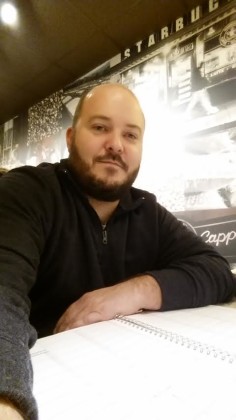My Buddhist Lessons
April 9, 2016—after David Shumate Five months old, my daughter teaches me how to be Buddhist. Her sleep sack is a simple robe. Her bottle, a begging bowl. A semi-bald head and…
—after David Shumate
Five months old, my daughter teaches me how to be Buddhist. Her sleep sack is a simple robe. Her bottle, a begging bowl. A semi-bald head and verbal silence serve as outward signs of her inner refuge. Place a crayon in her hand and she marks the page in Sanskrit. Sit her on a mandala patterned play mat and she mumbles mantras to a sangha of Taggie toys. When she wants to teach me about desire, she lunges for a stuffed tiger. To instruct how desire leads to grasping, she takes the tiger and clutches him to her chest. To teach how grasping leads to suffering, she shakes him and begins to cry. To impart the lesson that liberation comes through non-attachment, she throws him to the floor and squeals in joy. Her compassionate nature even allows me to accumulate merit. Change me. Hold me. Feed me. And at night her screams ring out like tiny bells, to remind me that the purpose of my life is to awaken.
sunrise
a tiny thumb rubs
mala beads
—Kyle Craig (Marion County)
This poem first appeared in Haibun Today.

Kyle D. Craig lives in Indianapolis where he works as a mental health counselor. His haiku, senryu, tanka, and haibun have been published in a number of journals, including Modern Haiku, The Heron’s Nest, A Hundred Gourds, Ribbons, and Haibun Today. Recently, his haiku won a Sakura award in the Vancouver Cherry Blossom Festival Haiku Contest, and his haiku will be featured in the anthology galaxy of dust: The Red Moon Anthology of English-Language Haiku 2015. His free verse poems have appeared in Tar River Poetry, Blue Earth Review, North Dakota Quarterly, and Flying Island.
Poetry Prompt: Life Lessons
How has someone given you instruction on how to live? This might be a family member, a favorite baseball player, the woman at the cash register, or someone from the past in the form of a ghost. Maybe your teacher is not human. It could be a pet cat or a houseplant or a pencil. Your poem might take the form of a haibun—a Japanese form combining prose poem and haiku.
Indiana Humanities is celebrating National Poetry Month by sharing a poem and prompt every day in April. Indiana Poet Laureate Shari Wagner selected these poems and wrote the prompts.


